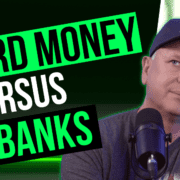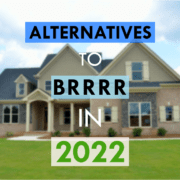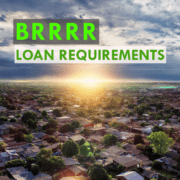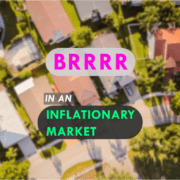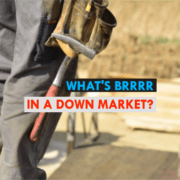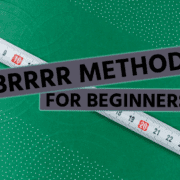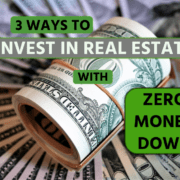When inflation hits, BRRRR does not die.
Real estate investment in general is extremely money-dependent. BRRRR in particular totally relies on the availability of funds.
So does that mean BRRRR dies when inflation hits and money tightens?
Absolutely not. You can be successful with BRRRR even during times of uncertainty. But that doesn’t mean BRRRR will look exactly the same as it did in a hot market.
Here’s what to know about BRRRR investments during inflation.
What Does BRRRR Mean?
First, let’s start with the basics. What does BRRRR mean? Your understanding of BRRRR will determine your success when inflation hits.
BRRRR comes down to two key factors.
1) Buying Undermarket Properties
Buying undermarket properties is the crux of BRRRR.
This important point has been confusing to people in the last few years. That’s because truly good undermarket properties have been hard to find.
We’ve been seeing people buy at 80-85% of a property’s ARV. In the near future, those values will come down.
Back in 2010, people were able to buy properties for 60-65% of the ARV. We’re hoping that’s where this next market will take real estate investors.
So, what does BRRRR mean? First of all, it means buying undermarket properties. And with inflation, lower priced BRRRR properties will be coming back.
2) Using a Two-Loan Strategy
The other foundational concept in BRRRR is its two-step loan process.
The whole point of BRRRR is to get into properties with little to no money down. To do this, you need two loans – one to acquire it, and one to hold it long-term.
Once you own the property (using the first loan), you can refinance it using the appraised value (via the second loan).
If you can buy a property undermarket (with private money) and own it, you capture the equity of the house when you refinance it.
Instead of pulling more money from your pocket for your next deal, you can use the equity you create with one BRRRR to buy more real estate – even with inflation.
Learning More About What BRRRR Means
BRRRR means two things: buying undermarket real estate, and utilizing two loans to do it.
We’ve been doing BRRRR for over 15 years – before this strategy was even called “BRRRR.” For more on BRRRR fundamentals, check out these YouTube videos, or reach out to us anytime at HardMoneyMike.com.
BRRRR In an Inflationary Market
For real estate investors, including BRRRR, inflation means money tightens up.
Money tightening means there’s less money for all real estate investors. The federal government makes money harder to get to slow down spending.
So how can you expect these effects of inflation to impact BRRRR?
How an Inflationary Market Changes BRRRR Lender Requirements
In the lending world, money tightening looks like lower loan-to-values. Maybe your hard money lender used to give you 75% of the anticipated value of the home, but now they’d give 70%.
LTVs are tightening not just on the front-end BRRRR loan, but the back-end refinance as well. Lenders are:
- Tightening their cash out requirements
- Offering lower LTVs
- Raising income requirements
- Expecting higher down payments
- Requiring just plain better deals.
A big qualification to focus on is lenders’ credit score requirements. The minimum acceptable credit score has gone up by 20-40 points.
If your credit is on the border, your main priority should be to raise your score. There’s less money out there. You want to be one of the people who can get leverage once property prices go down.
BRRRR Lenders and Equity in Inflationary Times
Lenders want to make sure they’re lending to the best of the best. They’re concerned with equity.
Prices are going down. So if they lend at 70% LTV, then in 6 months home prices go down 10%, but then that 70% is no longer 70%.
So lenders will be more conservative with their LTVs. Money in general will be more conservative during this time. Eventually, we’ll land at a “new normal,” and everyone in the money world can work off the same level. For now, things are heading down in an unpredictable way, so money will be harder to get.
If you’re investing in BRRRR in an inflationary market, stay aware of the constant changes. Rates have more than doubled this year, LTVs are going down, and the cash flow on your rental properties will take a hit.
New BRRRR Lending Options with Inflation
With rates so good over the last three to four years, all BRRRR investors were looking at one loan product – the 30-year fixed mortgage.
With rates increasing, however, you might need to look beyond the 30-year fixed loan to get into good BRRRR properties. Here are some options that can bridge your properties until rates go down.
ARMs (Adjustable-Rate Mortgages)
You can get three-, five-, or seven-year ARMs. Whichever time length you pick, the rates will be fixed during that period. Afterward, the rates become adjustable.
In rising markets, these loans aren’t that great. In declining markets, though, they can be the perfect loan to bridge you into a rental property.
You can get an ARM for .5-2% lower than a 30-year fixed mortgage. These lower rates can cash flow a property until either prices go up and you can sell, or rates go down and you can refinance.
Interest-Only Loans
With the interest-only BRRRR lending option, you don’t pay any principal for the first ten years.
An interest-only loan is appealing right now because it keeps cash flowing. Your loan amount doesn’t go down, so it’s not a great option for the long-term. But it is a good lending option to get you into a property during this next market.
40-Year AM (Adjustable Mortgage)
A 40-year AM spreads the loan payments over 40 years instead of the 30 with a traditional fixed mortgage. This adjustable mortgage gives you lower monthly payments… and more cash flow.
What To Keep In Mind with These BRRRR Inflation Lending Options
ARMs give lower rates, 40-year AMs offer lower payments, and interest-only loans postpone the principle.
Keep in mind: these loans won’t help your equity or get a property paid down quickly. But they are good options to get into properties while values are low and funding is tight.
Remember that conditions of BRRRR are ever-changing. Get plugged into the money side of investing, and talk to lenders to see what’s available for you in inflationary times.
BRRRR Loan Requirements with Inflation
BRRRR has two loans – hard money to buy, long-term to refinance. With inflation, both BRRRR loans can expect lower LTVs. What else can you expect?
Hard Money BRRRR Loan Requirements
Many private money companies – particularly bigger, national lenders – are requiring 20% down.
Hard Money Mike is a little different. We fund using real private money, so our loans aren’t as dictated by federal rates. We still go up to 100% on financing, as long as you’re approved for your long-term loan up-front.
Smaller lenders can give you a better advantage with BRRRR during inflation. But you should still expect many private lenders to offer lower LTVs.
Bank BRRRR Loans with Inflation
Long-term loans are decreasing, making it harder to cash out. Traditional lenders could go down to 70% or 65% LTVs, or just have tougher requirements.
Money is shrinking, so the pot of money available to you on either BRRRR loan is shrinking.
The Plus Side of BRRRR and Inflation
What’s the good in all of this? If you’re in a bad financial position, you’ll have a hard time continuing your real estate career in inflationary times.
But, if you’re in a good position, you’ll be able to find fantastic properties in your pricepoint. And you’ll be able to find them for 20-40% less money than you could a year ago.
Don’t fight what’s happening with the economy – figure out how to use it.
Understand lending requirements now. If you get into a BRRRR, fix it fast and refinance fast. Figure out your BRRRR’s long-term loan first before you look for a short-term loan.
Things are changing rapidly in the real estate investment world. Get yourself in the best position to be able to work with it.
Alternatives to BRRRR in 2022
We’re probably three to six months out from the really cheap homes getting on the market. How can you finance BRRRRs as values go down?
BRRRRs are about getting into value-add properties with little to no money down. But as we’ve mentioned, getting into the properties will be the hard part with money tightening.
Will there be any good alternatives to BRRRR in 2022?
Subject Tos As an Alternative to BRRRR with Inflation
Here’s another way to look at rental properties with a BRRRR spirit:
What if you could take over someone’s loan and house with no money down, no credit or other requirements, 100% financing, and a great rate?
That’s what subject tos are.
You’ll see more and more subject tos popping up soon. Maybe someone bought their home at 100% last year, but values have come down 10-15% so they can’t sell without losing money or putting more in. People don’t want to go through foreclosure, so in a situation like this, they’d be interested in a subject to.
You can take over the mortgage and put the home in your name. You can do it properly, through title, and create a rental property using someone else’s financing.
This method doesn’t require your income, your credit, or any other qualifications. It only requires a secure set-up, and for you to make the payments on the mortgage.
This is a great way to purchase rental properties as an alternative to BRRRR in 2022 if you don’t have leverage.
Owner Carries in 2022
An owner carry can happen when the seller owns a property free and clear. In this situation, the owner takes on the mortgage.
The seller would likely plan to invest the money they get when the house sells. But the stock market is up and down, and banks only offer 2% maximum interest rates in CDs and accounts.
For the owner, carrying the mortgage when they sell to you is a way to double or triple their interest rate, secured by an asset they already know.
For you, an owner carry is easier, cheaper money. You won’t find a 5% interest rate, with 100% financing and no credit check anywhere else.
Open-Minded Financing Alternatives During Inflation
There’s creative financing available in the real estate investment world.
Whether it’s subject tos, owner carries, or OPM relationships, it’s important to look always into your options for doing zero down investments. Especially now that BRRRR loans are less likely to cover 100% financing.
BRRRR Is Not Dead During Inflation
BRRRR isn’t dead! But it may look different.
This is the best time to get prepared – before the housing market completely dips. We can help you get ready.
Whether you have questions about setting up subject tos, or you’re wanting to jump into BRRRR when prices drop, we can help.
Reach out to us on Facebook, or email us at info@hardmoneymike.com
Use us as a resource – this is the time to be money prepared.
Happy Investing.


